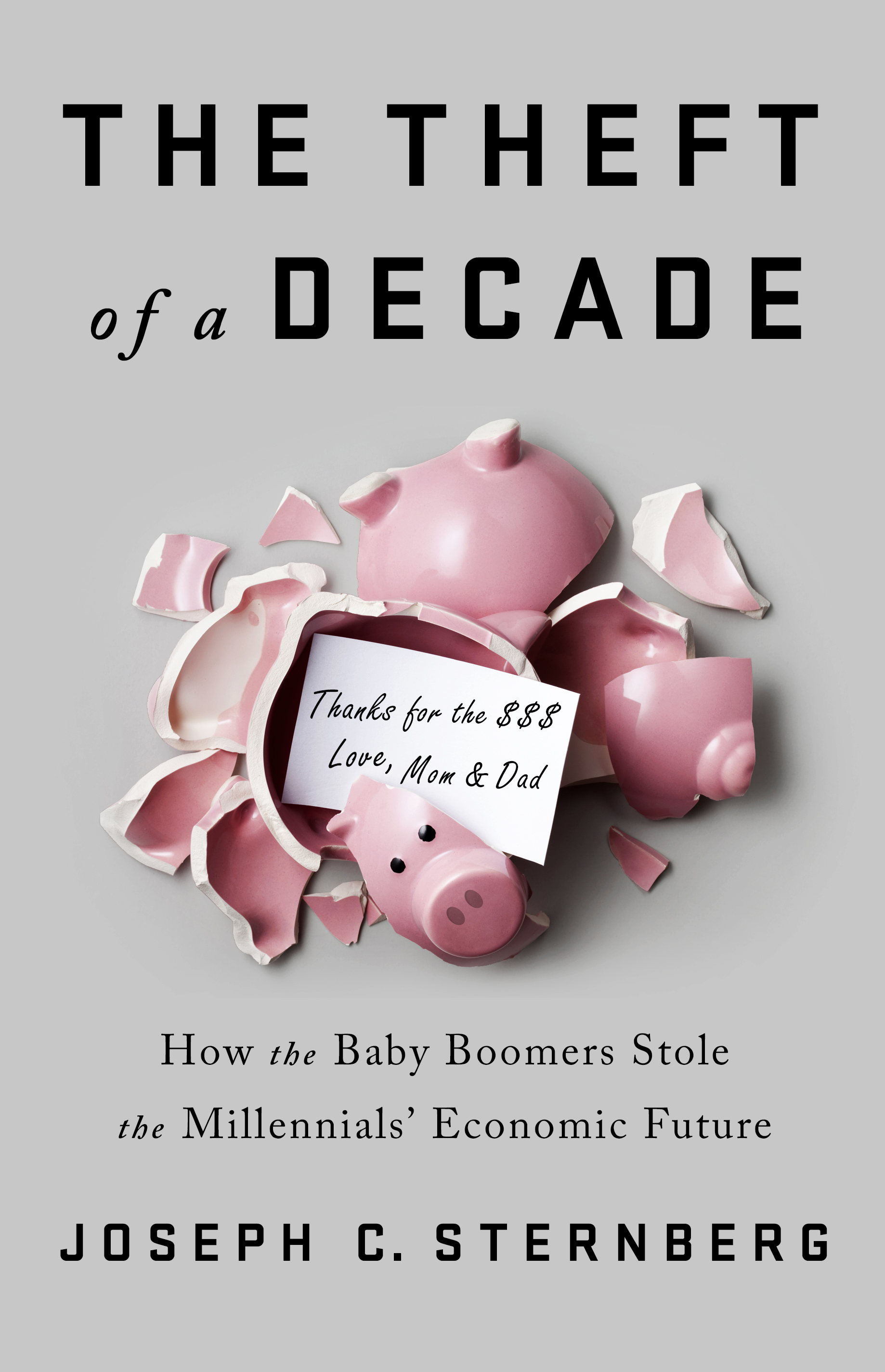My fellow Millennials, I regret to inform you that our elders are at it again. Suze Orman, personal finance guru and television host (b. 1951), has decided that we’re poor because we buy too many $4 coffees. Step back from the espresso bar, my young friend! Brew a cup of instant joe at home. In a few short decades, you too will be a millionaire, just like her.
So began another round in the endless online bout between the Baby Boomers and the Millennials. They accuse us of being spendthrifts with no work ethic, special snowflakes who melt as soon as we’re criticized and run off to our therapists to cry about it. We point out that they inherited the strongest economy the world has ever known and then ran it off a cliff.
Into this fray steps Joseph C. Sternberg, a would-be champion of Millennials. In The Theft of a Decade: How the Baby Boomers Stole the Millennials’ Economic Future, he uses hard data to back up what our therapists have been trying to tell us for years: It’s all our parents’ fault. This is a really nice thing to hear. For that very reason, it deserves scrutiny. Millennials are still struggling to overcome the effects of the 2008 financial crisis, and Sternberg clearly wants to see his peers prosper. At the same time, he turns out to be wedded to the kind of economic policies that got us into this mess in the first place.

(Photo: Public Affairs Books)
At its best, The Theft of a Decade shows just how bad the economy has been for Millennials, and how bad it remains. As Sternberg demonstrates, “The key fact about the Great Recession is that the pain of job losses wasn’t evenly distributed.” Most of the jobs lost were in the $27,000 to $40,000 range, “mid-skilled jobs—those in what used to be the fat middle of the job market.” As these jobs disappeared, older workers were pushed “back down the ladder, cutting off the rungs young people traditionally used to ascend their own career ladders.” As a result, Millennials tended to start careers later than their parents did, and are climbing more slowly. Sternberg argues persuasively that this “could hamper Millennials’ earnings for decades.”
To make matters worse, Millennials also carry unprecedented student debt (“$1.4 trillion … as of early 2018,” Sternberg notes). They can’t afford to build wealth in traditional ways, like through homeownership, because the price of housing is rocketing in “areas where the jobs are, especially at the most highly educated, highly skilled end of the job market.” Saddled with debt, unable to progress in their careers, and seeing landlords confiscate what little money they have, “42 percent of Millennials worry about financial security ‘all the time’ or ‘a few times a week or more.'” Is it any wonder we spend so much time face-down on the couch, whether the therapist’s or our own?
And it’s all our parents’ fault, Sternberg says. His argument is that the Baby Boomers tried to have their cake and eat it too. They embraced an “economic centrism that holds that one can meld the power of the state with the power of the market to deliver both prosperity and economic security.” They wanted tax cuts and Social Security, money now and later.
But hold on—which half of the “centrism” has to go, the tax cuts or the Social Security? Something’s going on behind the author’s sketch of intergenerational warfare. Sternberg describes himself as a “free-market conservative or classically liberal.” And sure enough, in his account, government is always the problem, the free market always the solution.
Why do Millennials have so much student debt? The “market mechanism is missing in student loans,” Sternberg explains. Why weren’t there any jobs when we graduated? Government regulations have led to “high labor costs and ultra-low capital costs … encouraging businesses to invest in anything other than hiring.” Why can’t we afford houses? In order to save homeowners after the 2008 crash, “Boomers in Washington have obsessed over sustaining artificially high house prices via the Federal Reserve and other policies.” What caused the 2008 crash? Maybe Wall Street made some bad bets, but only because government lending agencies like Fannie Mae and Freddie Mac were “goading private-sector institutions to take more mortgage lending risks.” Oddly, Sternberg never mentions the repeal of the Glass-Steagall Act, or how the Commodities Futures Modernization Act created the markets that crashed the world economy. This is like writing a history of the Titanic without mentioning an iceberg.

(Photo: Eivind Hansen)
Time after time, Sternberg’s argument “isn’t that the free market has failed, but that Washington has failed to let the free market work as it should.” After a while, Sternberg starts to sound like the guy in your freshman dorm who always insisted that the real free markets (just like real Marxism) still hadn’t been tried.
Haven’t they, though? To paraphrase hall-of-fame football coach Bill “The Big Tuna” Parcells, at some point you are what your record says you are. With the election of Ronald Reagan in 1980 came “the era of the supply-side revolution,” Sternberg enthuses, “which held that suffocating regulation, high taxes, and rampant inflation were stifling investment, and with it productivity and opportunities for good jobs and rising standards of living.” For the past 40 years, lawmakers in both parties have been cutting taxes, dismantling the welfare state, rewriting regulations in favor of industry, and privatizing public goods.
By any stretch of the imagination, then, classical liberals like Sternberg have gotten a whole lot of what they wanted for the last four decades. So what’s their record? Stagnant wages, lower rates of social mobility, and wealth accumulating almost exclusively in the hands of the super rich. These failures are not the result of “economic centrism.” They’re what happens when laissez-faire economic theories are put into practice. The generational framing just obscures the underlying economic causes.
So why is the “Millennials vs. Boomers” framework so durable and appealing? Perhaps because it seems to speak to everyone’s experience. What Millennial has not belonged to an institution—from corporations to colleges and churches—that appeared to run primarily for the benefit of those at the top? And plenty of Boomers must have looked down the organizational ladder and seen resentful, hungry young eyes looking back at them. In its way, the book’s framing of generational conflict reinforces the bleak moral message behind laissez-faire economic theory: Life is a struggle over scarce resources, and in order for you to win, someone else has to lose.
It doesn’t have to be this way, though. Blaming our parents may feel good, but it won’t ultimately solve our problems. (Our therapists told us that too.) As Sternberg points out, the Baby Boomers wanted what their parents had enjoyed. “Along with yearning for the shared prosperity Boomers remembered from their youth,” Sternberg writes, “they also missed a greater sense of economic security.” The Reagan Revolution delivered neither, but there’s still time to make common cause with our parents and try something else. As Sternberg reminds his readers, “We’ll be responsible to ourselves and our own children if we fail.”

Pacific Standard’s Ideas section is your destination for idea-driven features, voracious culture coverage, sharp opinion, and enlightening conversation. Help us shape our ongoing coverage by responding to a short reader survey.





